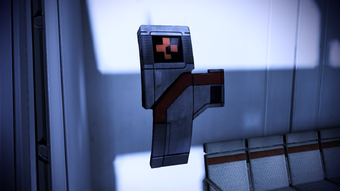Medi-gel is an all-purpose medicinal salve combining an anaesthetic and clotting agent used by paramedics, EMTs, and military personnel, produced by the Sirta Foundation. It heals various wounds and ailments, instantly sealing injuries against infection and allowing for rapid healing by having the gel grip tight to flesh until subjected to a frequency of ultrasound. It is sealable against liquids - most notably blood - as well as contaminants and gases. While technically its properties make it illegal under genetic modification laws, in this case the restriction is ignored because of the product's beneficial properties.
History and Use[]
The modern incarnation of medi-gel was developed by the Sirta Foundation, a human corporation known for its research in genetics and bio-engineering. Despite its biogenetic nature, inferable both from its ostensible ban under the Citadel Council's genetic modification laws and from the fact that it utilizes biological nanides to repair damaged tissue, medi-gel is apparently capable of repairing entirely synthetic or artificial platforms in addition to healing organic lifeforms. An Alliance News Network broadcast in 2186 quotes a Lieutenant Girard stating his intentions to use medi-gel to aid injured allies including geth, while Commander Shepard is routinely able to remotely repair and reactivate geth and mech team members with the substance during their missions.
Medi-gel has strong sedative properties and is able to cause unconsciousness in subjects, with large doses capable of inducing a comatose state. This can be the desired effect in cases of dire wounds to a patient, as the near-hibernation of such a coma slows the harmful effects of critical injuries, preserving vital organs and systems. Medi-gel varies in how it is delivered: it can be dispensed from squeezable tubes or similar small portable containers and applied manually; or, in the case of severe or internal injuries, it can be injected intravenously. Medi-gel injections are fast-acting and have extremely potent healing effects, especially if the dosage is large.
In 2183, a minor dose of medi-gel can be applied instantly in the field with the aid of an omni-tool. Remotely deployed, this can provide a rapid boost to the health of an entire infantry squad, a vitally useful resource in the heat of battle. Medi-gel stocks are almost ubiquitously available in most buildings, large vehicles, and installations, reducing the need for excessively large personal supplies. With specialized medical training, medi-gel application can be used to counteract a wide variety of toxins and poisons, as well as to revive subjects that are near-death, unconscious, or otherwise severely injured or incapacitated.
Around 2185, medi-gel technology advanced with improvements to how the medicine is delivered by standard combat hard suits. A new automatic self-healing system is managed by an armor suit's microframe computers, using small quantities of medi-gel when required in order to slowly regenerate the wearer's health during combat. Special cybernetic augmentations for skin, muscle, and bone tissue were also developed that speed medi-gel delivery to wound sites. Larger doses of medi-gel can still be manually and remotely deployed via omni-tool in case of emergency to remedy serious injuries to any member of a combat team.
By at least 2186, medi-gel formulas can be tailored to the specific needs and biochemistries of various species. For example, Cerberus research produces a type of medi-gel enhancement that its scientists conclude would be exclusively and uniquely effective when used on hanar subjects. Certain Alliance soldiers were known to have erroneously believed that medi-gel would not work on batarians but this is not the case. Former Cerberus operative Maya Brooks claims that medi-gel is able to mimic and blend in with the skin pigmentation of users. Brooks also claims that overdosing on the substance may cause side-effects that include alterations of the user's perceptions and mood. Medi-gel also may be capable of improving circulatory efficiency, possibly by enhancing the oxygenation of blood or its user's nearest equivalent.
Despite many advances, however, medi-gel has limitations. It can't compensate for massive blood loss, evidenced when Commander Shepard is unable to save a wounded quarian civilian encountered on Rannoch. While it does have antiseptic properties, a conversation between an asari physician and her human patient reveals that medi-gel is often unable to halt infections that have already set in prior to its application. The amputation of gangrenous or necrotic limbs is sometimes still an unfortunate necessity, even in the 22nd century. Medi-gel is also not able to fully repair other forms of serious injury, in which case its purpose is to act primarily as a stabilizing agent, keeping patients alive until they can be given more specialized treatment or surgery.
Mass Effect[]
- For the ability that deploys medi-gel during combat in Mass Effect, see First Aid.
Medi-gel can be found on missions in the field from containers and crates, and from loot obtained after killing enemies. It can also be freely refilled between missions at no cost from several locations: the SSV Normandy's medical bay, Dr. Chloe Michel's Med Clinic on the Citadel, and potentially from Shepard's apartment on Intai'sei. At various shops, Shepard can purchase upgraded personal storage that progressively increases the number of medi-gel doses that can be carried, up to a maximum of 10 units from the starting default amount of 5.
Mass Effect 2[]
- For the ability that deploys medi-gel during combat in Mass Effect 2, see Unity#Mass Effect 2.
Medi-gel can be acquired through opening aid containers or wall-mounted aid stations. Shepard can research or buy upgrades which allow the Commander to carry additional medi-gel units, from an initial carrying capacity of 3 up to a potential maximum of 9 units. If Shepard picks up medi-gel while already carrying the maximum amount, the medi-gel will be salvaged for a total of 100 credits. Medi-gel, like heavy weapon ammunition, is not refilled between missions and Shepard can only restock by finding medi-gel in the field.
Mass Effect 3[]
- For the ability that deploys medi-gel during combat in single-player Mass Effect 3, see First Aid#Mass Effect 3.
- For how medi-gel works in Mass Effect 3 Multiplayer, see Mass Effect 3 Multiplayer/Character Customization#Equipment.
On missions, medi-gel can be found in the field: med-kits contain up to 2 medi-gel units, while wall-mounted med-stations may contain up to 3. Shepard's medi-gel stock is replenished to full capacity automatically between missions. Shepard starts with the ability to carry up to 3 medi-gel doses and can purchase upgrades increasing maximum medi-gel carrying capacity several times during the campaign; if the Normandy has a medical officer, there will also be an opportunity to upgrade the amount or efficiency of the medi-gel Shepard carries even further. Instead of earning credits for surplus medi-gel found on missions, Shepard receives +150 experience per unit for salvaging it while at full carrying capacity.



